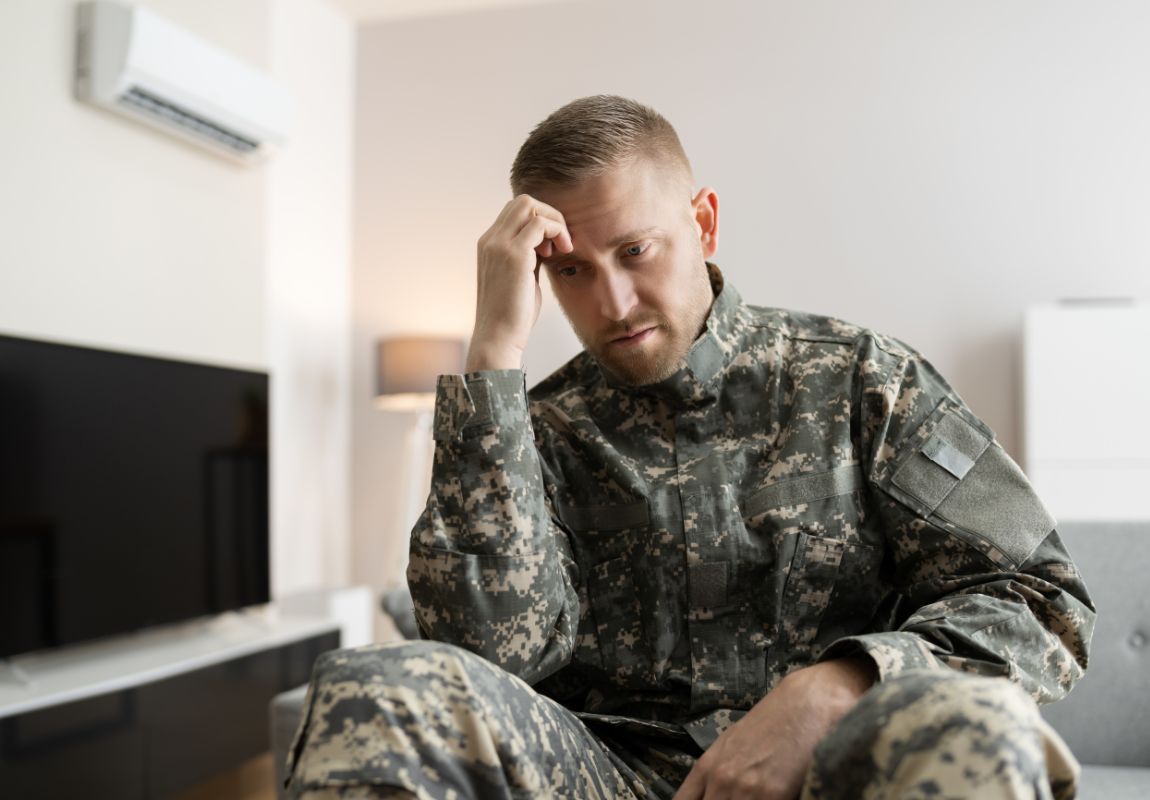Living through the challenges of military service can leave lasting scars on a person’s mental health. One of the most common issues among veterans is post-traumatic stress disorder (PTSD), often accompanied by struggles with alcohol abuse. Why is there a connection between PTSD and alcohol abuse, and where can veterans find help for these challenges? To understand PTSD and alcohol use, it’s helpful to learn as much about trauma and alcoholism as possible. A treatment center like those operated by Aliya Health Group can help stop you or a loved one’s addiction and alcohol misuse.
Why Do Military Veterans Have PTSD?
Many military veterans have been in combat or on missions that exposed them to terrifying and life-threatening situations. The experiences can leave deep emotional scars that don’t just go away when they return to civilian life. They may deal with hallucinations, nightmares, and flashbacks. It’s common for veterans to experience helplessness, suicidal thoughts, aggression, self-harm, depression, and anxiety—all of which are symptoms of PTSD.
While PTSD can happen to anyone who’s lived through trauma, it’s slightly more common among veterans than civilians. At some point in their life, 7 out of every 100 veterans will have the disorder. PTSD is also more common among female veterans (13%) versus male veterans (6%). Knowledge about transgender veterans and those who do not identify as male or female (non-binary) is still ongoing.
PTSD symptoms can be triggered by many things for veterans, from loud noises that sound like explosions to certain smells that bring back memories of combat. The mind can get stuck in a loop, replaying terrifying moments over and over again. Even when you try to forget or move on, memories can come crashing back unexpectedly, making it hard to feel safe or calm.
Get confidential help from our addiction and mental health treatment facilities located across the United States. Call to join one of our quality programs today!
Speak With Our Admissions TeamCan Alcohol Make PTSD Worse?
It’s common for trauma survivors to wrestle with distressing symptoms long after their experience. In a search for relief, some veterans turn to alcohol as a form of self-medication, to numb their symptoms and flashbacks. This is why PTSD and alcohol abuse often go hand-in-hand. Researchers estimate that nearly 20% of veterans have PTSD and co-occurring alcohol use disorder.
For military veterans with PTSD, using alcohol can be a dangerous trap. Because endorphin levels increase with alcohol use, PTSD sufferers may experience relief from uncomfortable symptoms, including irritability, depression, and anxiety. While alcohol initially offers a sense of relief, it eventually makes the problem worse, trapping you in a cycle of trauma, alcohol usage disorders, and deteriorating mental health.
Studies show those who self-medicate their PTSD with alcohol may experience an increase in symptoms, including:
- Depressive episodes
- Severe anxiety
- Insomnia
- Suicidal thoughts
- Misuse of other drugs
- Detachment from others
What Are the Dangers of PTSD and Alcohol Abuse?
Relying on alcohol instead of getting help can make things much worse, especially when it comes to mental health. Up to half of adults with both PTSD and alcoholism also have one or more of the following:
- Panic attacks, extreme fears or worries, or compulsions (things like checking door locks over and over)
- Mood problems including depression
- Attention problems or behaving in ways that harm others
- Addiction to or abuse of street or prescription drugs
- Alcohol-induced psychosis
- Long-term physical illness such as diabetes, heart disease, or liver disease
- Ongoing physical pain
It’s important to realize that drinking to cope with difficult emotions is a form of avoidance, and avoidance can make PTSD symptoms last longer.
Looking for quality treatment for substance abuse and mental health that’s also affordable? Aliya Health Group's treatment facilities accept most major insurance providers. Get a free insurance benefits check now!
Check Your CoverageWhere Can a Military Veteran with PTSD and Alcohol Abuse Go for Help?
Due to the stress and trauma that often accompanies military service, veterans have unique treatment needs. Fortunately, there are professional treatment centers that offer specialized programs designed specifically for veterans with PTSD and alcoholism. An effective veteran treatment program will consist of:
- Licensed and certified medical staff
- Personalized treatment plans
- Dual diagnosis treatment
- Seeking Safety curriculum
- Evidence-based practices
- Intensive therapies
- Trauma-informed care
- Life-skills training
- Case management
- Aftercare planning
- Alumni services
When taking part in treatment programs designed specifically for them, veterans don’t have to worry about being judged or misunderstood. Plus, these centers offer a range of resources and support networks that can make a big difference in a veteran’s journey to recovery.
Currently, the U.S. Department of Veterans Affairs uses a VA disability rating to help veterans get financial assistance for treatment. The rating works by giving each condition you struggle with a percentage on a severity rating scale from 0 to 100%. The higher you are on the scale, the more financial assistance you may claim for your treatment services. The PTSD and alcohol VA rating is 70%, which means you have the flexibility to find the treatment facility that’s right for you.
Because PTSD and alcohol abuse are so intimately connected, treatment must address them both.
Alcohol Addiction and PTSD Treatment at Aliya Health Group
At Aliya Health Group, we understand veterans have unique needs. As one of our specialty treatment options, our Valor Program offers specialized, trauma-informed care to veterans within a supportive recovery community.
By joining our veteran’s rehab program, you can recover in a safe, accepting space alongside peers who have a firsthand understanding of what you’re going through. Depending on your specific needs, we’ll work with you to create a personalized treatment plan that includes trauma-focused approaches and treatment for co-occurring mental health disorders.
Some of our treatment services for veterans include:
- Individual and group therapy
- Dual diagnosis treatment
- Psychiatric medication management
- Medication-assisted treatment (MAT)
- Evidence-based therapies
- Holistic and wellness services
- Psychoeducation
- Life skills training
- Community integration
Your treatment team will be comprised of credentialed and experienced individuals from many backgrounds. Some may include military personnel, veterans, and retired first responders. All Valor program staff are trained in military culture sensitivity and trauma. This allows us to provide specialized treatment for PTSD, substance abuse, and other mental health issues commonly experienced by veterans. Our comprehensive programs teach you how to manage PTSD symptoms, stop using drugs and alcohol to self-medicate, and adopt healthy coping skills that help you move forward.
We know that returning to civilian life can be a struggle, so we equip you with the life skills needed after treatment as well. You’ll learn coping strategies, trigger management, and relapse-prevention strategies as alternatives to self-medication. Our team helps with a variety of areas, including work, social, legal, and housing needs—all designed to help you achieve a fulfilling life of sobriety.
Contact us today to learn more about our Valor program. We can verify your insurance and offer more on how you can benefit from our substance misuse services. Call us today at 888-973-2079.
- How Common is PTSD in Veterans? – PTSD: National Center for PTSD (va.gov)
- Substance use disorders in military veterans: prevalence and treatment challenges – PMC (nih.gov)
- PTSD and Problems with Alcohol Use – PTSD: National Center for PTSD (va.gov)
- PTSD and Substance Abuse in Veterans – PTSD: National Center for PTSD (va.gov)
- About VA Disability Ratings | Veterans Affairs



















